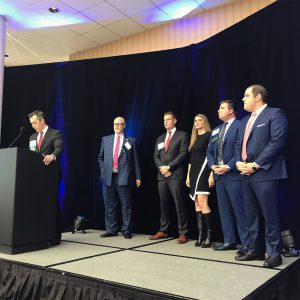 Attendees networking at the NAIFA-GWDC Success Summit.
Attendees networking at the NAIFA-GWDC Success Summit.
For the financial professionals who attended NAIFA-Greater Washington D.C.’s Success Summit held recently in Northern Virginia, the conference was the place to be for the information they need to take their practices to the next level of success. During the day-long event, industry leaders and top producers shared what it takes to build a successful business and encouraged attendees to never stop moving toward the practice of their dreams.
The case for curiosity
From NAIFA President Jill Judd, FSS, LUTCF, attendees learned about the importance of curiosity and the positive effects it can have on all aspects of their lives, including their businesses.
Curiosity is more important than it has ever been, said Judd, an agent with State Farm Insurance in Capitola, California. In fact, a recent issue of Harvard Business Review featured an article, which noted that curiosity paves the path to better performance and innovation.
Also, when people are curious, their level of learning improves, their retention rate increases, and they yearn for even more information.
 The Success Summit offered education and information for advisors in every career stage.
The Success Summit offered education and information for advisors in every career stage.
To satisfy her curiosity, Judd took it upon herself to learn how to play the clarinet. “As an adult, I have always wanted to learn how to play the clarinet,” she said. “So, I got one from a State Farm Agent, took it home, and learned how to put it together and play it. Learning to play music teaches you many things.”
Judd also accepted an invitation from her son to participate in Burning Man, where she helped build a huge temple as well as a robot.
So, what do going after a lifelong dream of playing music, building a successful insurance and financial-services business, and participating in a cultural festival have in common?
“All three pushed me to step out of what was comfortable into something entirely unknown,” Judd said. Also, according to a study, work that is related to curiosity is predictive of success. “If we look beyond efficiency, it all leads to success,” she added.
Curiosity also makes the mind active, she said. It opens people to new experiences, improves their decision-making skills, fuels employee engagement and boosts overall performance.
Creating a growth culture
From another speaker Michael Vasu, attendees gained the insights they need to develop a growth culture in their practice. Vasu, who is with American Income Life, learned these lessons over a 13-year career spent in building teams and developing highly competitive and winning cultures that lead to production growth and increased representative counts.
Among the insights offered by Vasu:
- Start each day the right way by reading informative books and listening to inspirational podcasts.
- Realize that if you are building a business, you will make mistakes.
- Understand your employees and realize that they must enjoy what they do.
- Read The Common Denominators of Success, a popular book that is essentially a speech a MetLife agent gave to conference attendees several decades ago. “It is one of the most impactful books I’ve read,” Vasu said. And one of the lines that have stayed with him over the years: “Successful people are willing to do what others do not want to do.”
How do successful people do it? They have a purpose that drives them. “You must ask yourself what will get you to do what you do not want to do—and do it,” Vasu added.
Vasu then offered several traits advisors should look for as they seek professional talent for their practices. “Character is the first and most important thing,” he said.
Other attributes include:
- Competence
- Confidence
- Commitment. Employees must be committed, he said, and when they make a promise, they must deliver on that promise.
- Chemistry with other members of the team
- Competitiveness
- Love of challenges. “Smooth seas never did make for a great sailor,” he said.
Selling LTCI
And from Harley Gordon, Esq., CLTCC, advisors learned a very important lesson about selling long-term-care insurance: Advisors who raise the subject of long-term care with clients should remember this: Risk doesn’t motivate people to purchase LTC products; consequences do.
When speaking with clients about limited and extended care, it’s important to change the conversation from one focused on risk to one focused on consequences, Gordon said. Clients need to be educated about the potential impact (or consequences) that an unexpected need for care could have on their ability to continue to protect and provide for those they love: “serious if not irreversible consequences.”
Men and women have different perspectives when it comes to risk, Gordon added. Men tend to minimize risk or even disregard risk; as a result, they don’t see the consequences. Women, on the other hand, view risk and consequences as basically the same.
Because of this, the conversation about care should not be product-driven, but purpose-driven, Gordon said. “These products should be positioned as an extension of the client’s absolute commitment to protect those he or she invited into their lives and promised to take care of.”
The solution to mitigating risk is not a product, but a plan, Gordon said, and extended care products should be presented as a “funding source” for that plan.
(NAIFA will soon launch the NAIFA Limited and Extended Care Planning Center – or LECP Center - led by Executive Director Carroll Golden. The website will serve as a virtual center to equip agents and advisors with information, designation and educational resources on trends and issues affecting the care industry and consumers. NAIFA members are invited to attend the ILTCI conference at a special rate.)
The New Congress: What you need to know
Knowing how to build a successful practice is always top-of-mind for many advisors--and so is the need to stay abreast of the legislative and regulatory events that impact the products and services they provide to their clients.
On hand to give attendees an update of the new Congress, its agenda and priorities, and what these might mean for the financial-services industry was Judi Carsrud, assistant vice president of federal relations with NAIFA.
After a quick review of the makeup of the House, Senate and the committees that are of interest to NAIFA members and their clients, Carsrud discussed the possible legislation that would enhance retirement savings programs and make it easier for financial advisors to help families adequately prepare for retirement.
Because of the new rules imposed on the House now that Democrats are in the majority, Carsrud also reviewed the threats to current insurance industry tax rules that lurk.
In addition, she discussed possible regulations that would raise the standard of care for broker-dealers and their registered representatives via federal securities rules, as well as state efforts to legislate or regulate standard of care.
Honors and accolades
 NAIFA-GWCD recognizes its Four-Under-Forty honorees.
NAIFA-GWCD recognizes its Four-Under-Forty honorees.
The conference was also the perfect venue to recognize the industry’s best and brightest. On hand to perform this important task was Brian Haney, CLTC, CFS, CFBS, LACP, who recognized the recipients of the NAIFA-Greater Washington Association’s Four Under Forty Awards. Haney is vice president of The Haney Group in Silver Spring, Md.
The recipients are:
- Sean Joiner, First Financial Group, Bethesda, Md.
- Colin Kimpel, CFP, Capitol Partners, Bethesda, Md.
- Carissa Miller, Transamerica, Darnestown, Md.
- Nathan Moore, AXA Advisors, LLC, Falls Church, Va.
In addition, NAIFA Treasurer Brock Jolly, CFP, CLU, ChFC, CLTC, CASL, CFBS, RICP, LACP, thanked the conference’s sponsors, volunteers and attendees for their support, dedication and hard work on behalf of the association.
“Thank you for being here,” he said. “We do this to give back to our association and to the industry that has meant so much to us.”







.png?width=300&height=300&name=CC%202025%20Ad%20(300%20x%20300%20px).png)
.png?width=300&height=600&name=Tax%20Talk%20Graphic%20-%20email%20tower%20(300%20x%20600%20px).png)



.png?width=300&name=NAIFA-FSP-LH%20with%20tagline%20-%20AT%20blog%20email%20ad%20(300%20x%20250%20px).png)
.png?width=728&height=89&name=2024%20Congressional%20Conference%20(728%20x%2089%20px).png)
